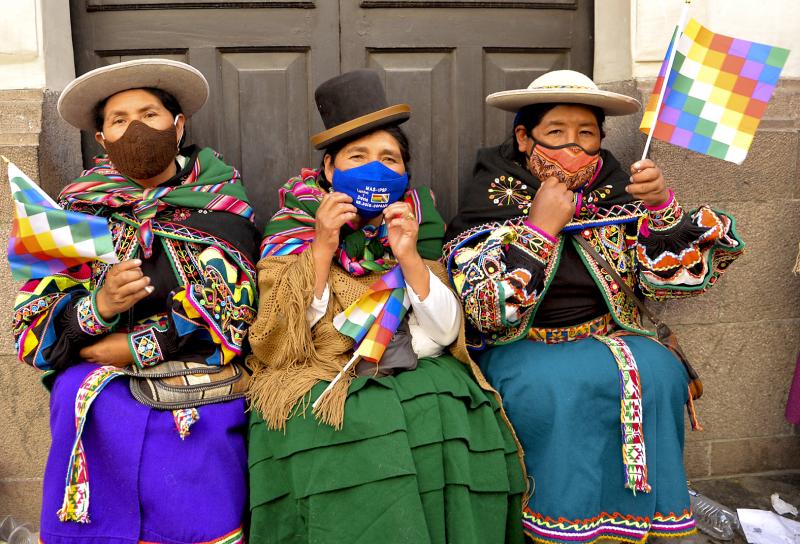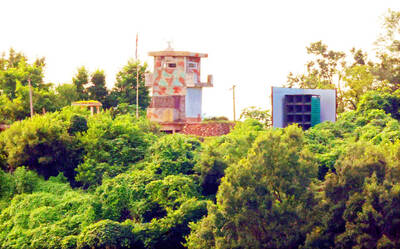New Bolivian President Luis Arce took office on Sunday, bitterly criticizing last year’s ouster of his mentor, former president Evo Morales, and branding the conservative interim administration that followed as “brutal.”
The former economics minister inherits a deeply polarized nation struggling with the COVID-19 pandemic and the economic hardships it has caused — the worst economic slump in four decades — as well as sharp divisions over the 14 years in power of Morales, the nation’s first indigenous leader.
Arce promised “to rectify what was bad and deepen what was good,” as he took office following an election in which his Movement Toward Socialism party won 55 percent of the vote.

Photo: AP
Bolivian Vice President David Choquehuanca, who is to head the nation’s congress, sounded a conciliatory note, saying the new government “signifies a new time to listen and heal wounds.”
Arce, 57, is fondly remembered by many Bolivians for overseeing a boom time for Bolivia’s economy as the nation benefited from rising global prices for its commodities and the leftist government’s social policies helped reduce poverty.
He has promised to retake that state-led model to rebuild and stabilize the economy.
Morales was not permitted to run in the election a year after abandoning power, at the suggestion of military and police leaders, following a wave of deadly protests against his claimed re-election.
The interim government that followed tried to erase many of Morales’ foreign and domestic policies, and prosecutors brought charges against the former leader and several of his aides, accusing them of fomenting violent protests.
Since winning election, Arce has downplayed speculation of a major role in his administration for Morales, whose popularity was dented in his final years as president by a refusal to accept term limits and by perceived growing authoritarianism.
Anti-Morales groups have been protesting again in recent days, especially in the eastern economic center of Santa Cruz, challenging Arce’s election as well.
Attendees at the inauguration included Spain’s King Felipe, the presidents of Argentina, Colombia and Paraguay, and Iranian Minister of Foreign Affairs Javad Zarif.
While outgoing president Jeanne Anez skipped the ceremony, the main runner-up in the election, centrist former president Carlos Mesa, appeared.
“We await signals he will have a good government and respect the opposition,” Mesa said, although may opposition figures left the ceremony to protest government actions that would make it easier to pass its programs through the legislature.

Philippine President Ferdinand Marcos Jr has fired his national police chief, who gained attention for leading the separate arrests of former Philippine president Rodrigo Duterte on orders of the International Criminal Court and televangelist Apollo Carreon Quiboloy, who is on the FBI’s most-wanted list for alleged child sex trafficking. Philippine Executive Secretary Lucas Bersamin did not cite a reason for the removal of General Nicolas Torre as head of the 232,000-member national police force, a position he was appointed to by Marcos in May and which he would have held until 2027. He was replaced by another senior police general, Jose

POWER CONFLICT: The US president threatened to deploy National Guards in Baltimore. US media reports said he is also planning to station troops in Chicago US President Donald Trump on Sunday threatened to deploy National Guard troops to yet another Democratic stronghold, the Maryland city of Baltimore, as he seeks to expand his crackdown on crime and immigration. The Republican’s latest online rant about an “out of control, crime-ridden” city comes as Democratic state leaders — including Maryland Governor Wes Moore — line up to berate Trump on a high-profile political stage. Trump this month deployed the National Guard to the streets of Washington, in a widely criticized show of force the president said amounts to a federal takeover of US capital policing. The Guard began carrying

Ukrainian drone attacks overnight on several Russian power and energy facilities forced capacity reduction at the Kursk Nuclear Power Plant and set a fuel export terminal in Ust-Luga on fire, Russian officials said yesterday. A drone attack on the Kursk nuclear plant, not far from the border with Ukraine, damaged an auxiliary transformer and led to 50 percent reduction in the operating capacity at unit three of the plant, the plant’s press service said. There were no injuries and a fire sparked by the attack was promptly extinguished, the plant said. Radiation levels at the site and in the surrounding

‘DELIBERATE PROVOCATION’: Pyongyang said that Seoul had used a machine gun to fire at North Korean troops who were working to permanently seal the southern border South Korea fired warning shots at North Korean soldiers that briefly crossed the heavily fortified border earlier this week, Seoul said yesterday after Pyongyang accused it of risking “uncontrollable” tensions. South Korean President Lee Jae-myung has sought warmer ties with the nuclear-armed North and vowed to build “military trust,” but Pyongyang has said it has no interest in improving relations with Seoul. Seoul’s military said several North Korean soldiers crossed the border on Tuesday while working in the heavily mined demilitarized zone (DMZ) separating the two Koreas. The incursion prompted “our military to fire warning shots,” South Korea’s Joint Chiefs of Staff